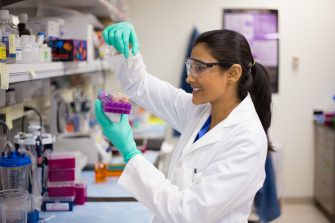UNSW researchers awarded $17m in NHMRC clinical trials funding
2025-05-09T09:55:00+10:00

The four UNSW projects to receive NHMRC funding will investigate improved treatments for sepsis, kidney disease, the health of people leaving prison and chronic lower back pain.
Photo: Adobe Stock
This round of funding will support UNSW researchers to address some of society’s most pressing health and wellbeing challenges.
UNSW Sydney researchers have secured more than $17 million from the National Health and Medical Research Council (NHMRC) for four clinical trials that address critical gaps in health care.
The projects will investigate improved treatments for sepsis, kidney disease, the health of people leaving prison and chronic lower back pain, which is the leading cause of disability worldwide.
Dean of UNSW Medicine & Health Professor Cheryl Jones welcomed the announcement.
“This is fantastic news and highlights the importance of targeted research to improve health outcomes across our communities, from people recovering after incarceration to those living with septic shock or chronic pain,” she said.
“I’m proud of our researchers’ commitment to ensuring that treatment options are effective, inclusive and backed by evidence.”
A total of 22 research projects Australia-wide will share in $79 million through this round of the NHMRC’s Clinical Trials and Cohort Studies grant scheme.
NHMRC CEO Professor Steve Wesselingh said the projects would play a key role in translating research into real-world healthcare improvements.
“Well-designed clinical trials and cohort studies provide vital evidence that helps bridge the gap between research and its practical application in health care,” he said.
“Congratulations to all the researchers receiving funding.”
CAPTIVATE trial: Personalised treatments for chronic kidney disease
Associate Professor Sradha Kotwal from The George Institute for Global Health and UNSW Medicine & Health has been awarded $5.6 million to investigate how combining different treatments can slow the progression of chronic kidney disease (CKD).
CKD affects over one in 10 Australians and 800 million worldwide. While current treatments help to slow the disease, they fail to stop it completely.
A/Prof. Kotwal said this novel trial would use different medications to see which combinations worked best together, potentially changing the way CKD patients were treated.
“The CAPTIVATE trial has immense promise for improving the lives of people with kidney disease. Our research will provide critical insights into how best to combine different treatment strategies and improve long-term outcomes, ultimately contributing to a more effective and personalised approach to care,” she said.
The adaptive trial will allow ineffective treatments to be removed and new ones added, speeding up research and improving patient outcomes.
CREST trial: Using genetics to personalise sepsis treatment
Professor Bala Venkatesh from The George Institute for Global Health and UNSW Medicine & Health has received $5.5 million to lead a trial investigating how a person’s genes influence their response to sepsis.
Sepsis is a life-threatening organ dysfunction that happens when the body overreacts to infection.
Septic shock remains one of the most serious and difficult-to-treat conditions. In Australia, there are an estimated 55,000 cases of sepsis per year. From these, 18,000 are admitted to intensive care units and there are 8700 deaths.
“This trial will allow us to see how the underlying biological response to the disease affects the patient’s response to the drugs,” Prof. Venkatesh said.
“We can then tailor their treatment to ensure they’re getting the most effective combination, which will be the first time precision medicine based on genetic information has been used to treat septic shock.”
RELIEF trial: Treating chronic lower back pain using radio waves
Professor Manuela Ferreira from The George Institute for Global Health and UNSW Medicine & Health has been awarded $3.6 million to test the effectiveness of radiofrequency ablation, a treatment that uses radio waves to block pain signals in people with chronic lower back pain.
There are 620 million people worldwide who suffer lower back pain. In Australia, 3.4 million people are affected by the disabling condition and it’s the leading cause of disability. It costs more than $8.4 billion annually in health care and lost work productivity.
Prof. Ferreira said that many who suffered with lower back pain relied on opioids to provide pain relief, which created dependency issues and eventually lost its effectiveness.
“Lower back pain is the world’s leading cause of disability, and current treatments often fall short,” Professor Ferreira said.
“Radiofrequency ablation has shown encouraging results in some studies, with many patients reporting pain relief just a month after the procedure, but there is no solid evidence on whether this works long term and is safe for the spine.
“This trial will provide high quality, placebo-controlled evidence on whether radiofrequency ablation is safe and effective. If successful, it could provide an alternative to opioids and surgery.”
POST Study: Improving health outcomes for people after prison
Scientia Professor Louisa Degenhardt from the National Drug and Alcohol Research Centre (NDARC) and UNSW Medicine & Health has received $2.3 million to lead a study on improving the health and wellbeing of people after they leave prison.
Prof. Degenhardt said people who leave prison frequently encountered difficulties related to mental health and drug use.
“Our project will provide world-first data on the effects of interventions to address these issues and provide specific data on the impacts for women and First Nations people,” she said.
“We will demonstrate the potential impact of making sure that more people are connected to mental health and substance use treatments most effective for them after their release.”
The project, known as the Prison Outcomes STudy (POST), will assess the health care and support services accessed by people after leaving prison.
“The multidisciplinary team brings together people with expertise in alcohol and other drugs, psychiatry, infectious disease, crime and criminal justice, mathematical modelling and biostatistics, alongside Aboriginal people and people representing or working with people who use drugs and people who have experienced incarceration,” she said.
Media enquiries
For enquiries about this story and interview requests please contact Yolande Hutchinson:
Tel: 0420 845 023
Email: y.hutchinson@unsw.edu.au






